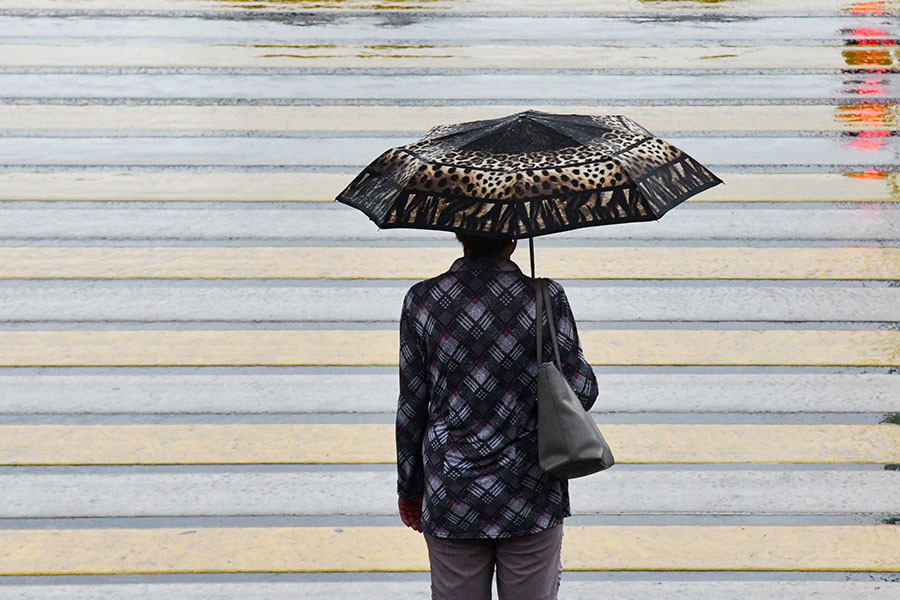Monday, July 29, may be the coldest day for this date since the beginning of the century. As reported in the weather center "Phobos", the thermometers will reach +13 ... +18 ° C.
“Moscow expects +15 ... +17 ° C. Below the norm by nine degrees, we expect a record of this century - the coldest day for this date, ”RIA Novosti reports the words of Phobos employee Alexander Sinenkov.
The temperature on this day may well be updated and the older record - for the last 70 years, the daily temperature in the capital at the end of July has never dropped below +15 degrees.
Experts report that overcast weather will last in the metropolitan area all week. On Tuesday and Wednesday, heavy precipitation and wind are expected. Moreover, these days can be the coldest this month and break the 1977 temperature record for these July numbers.
By the middle of the week the temperature may drop below 10 ° C during the daytime, at night it is expected that the thermometers will drop to +8 ° C. A relative straightening of the situation is expected by the weekend: the air warms up to +17 ... +22 ° C. However, weather forecasters do not exclude that it will also rain at the end of the week.
Moscow will warm up very slowly, said Marina Makarova, a leading specialist at the Hydrometeorological Center.
“Tomorrow there will be a cool night, in Moscow the temperature will be below ten degrees, in the afternoon there will be a lot of clouds, even in some places it will rain a little. The maximum temperature will be only +13 ... +15 ° C, over the region +10 ... +15 ° C. The whole week is cool, then they expect a slight warm-up, but very slow. Anyway, by the end of the week, the temperature will not even reach the norm - it will remain at +15 ... +20 ° C by the weekend, ”the expert told RT in an interview.
In addition, extremely low atmospheric pressure is expected this week, while the peak of the fall will be on July 31.
“For almost the entire week, the atmospheric pressure will be below the climatic norm. And the lowest pressure, as well as the lowest temperature, we will have 31 numbers. The pressure will be 7–9 units below the climatic norm, and then it will begin to slowly, but increase, ”said Pozdnyakova, chief specialist of the Moscow Meteorological Bureau, to RIA.
She also noted that she does not expect record high temperatures in the remaining weeks of the summer, although the weather situation in August may well return to normal and return to standard indicators.
“With regard to temperature records and extreme heat - I very much doubt that we shut them off, because in past years we have seen very high temperatures. According to the preliminary forecast of the Hydrometeorological Center, extremely high temperatures are not expected here in August. But this does not mean that the temperature will not be the same as it should be in August. For mid-August, the maximum temperature should fluctuate within +22 ... +23 ° C, night temperature - within +10 ... +12 ° C, and it is possible that this kind of weather still expects us in August "- told the expert.
- © Agency of urban news "Moscow"
Meanwhile, in Europe, abnormally hot weather is now established. In Germany, two temperature records were set in two days. On Wednesday, July 24, the temperature of +40.5 ° C heat was recorded in Heilenkirchen, and already on Thursday, July 25, weather forecasters recorded a temperature of +41.5 ° C in the city of Lingen.
On the same day, July 25, the record temperature set in Paris. The thermometer then rose to the mark of +42.4 degrees Celsius, this was the highest figure in the entire history of observations. In addition, temperature records have been updated in another 50 cities of the country.
Such critical weather fluctuations are due to the changing nature of the movement of air masses, Tatiana Pozdnyakova believes.
“If before the air masses followed from west to east, now there is a movement along the meridians. Warm humid air from the Pacific Ocean penetrates far to the north, cold air from the pole penetrates far to the south. And the heat and showers that we have now are just a manifestation of the meridian processes, ”she told kp.ru.
The reason for the cold weather in the European part of Russia was a cyclone, which brought cold air from the central regions of the Arctic. Experts call this phenomenon "ultrapolar invasion", the arctic air, moving to the south, pushes heat to the western borders of the European part of Russia.

